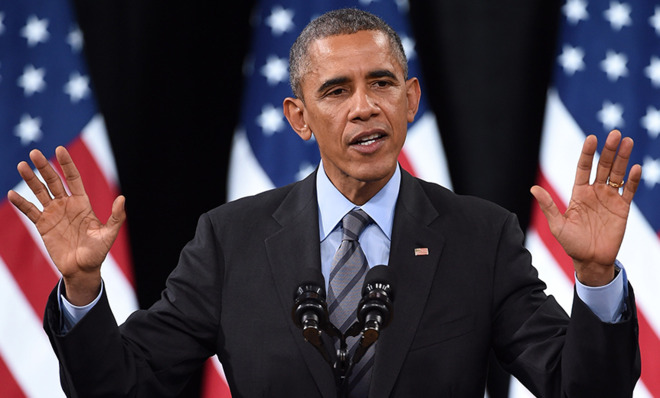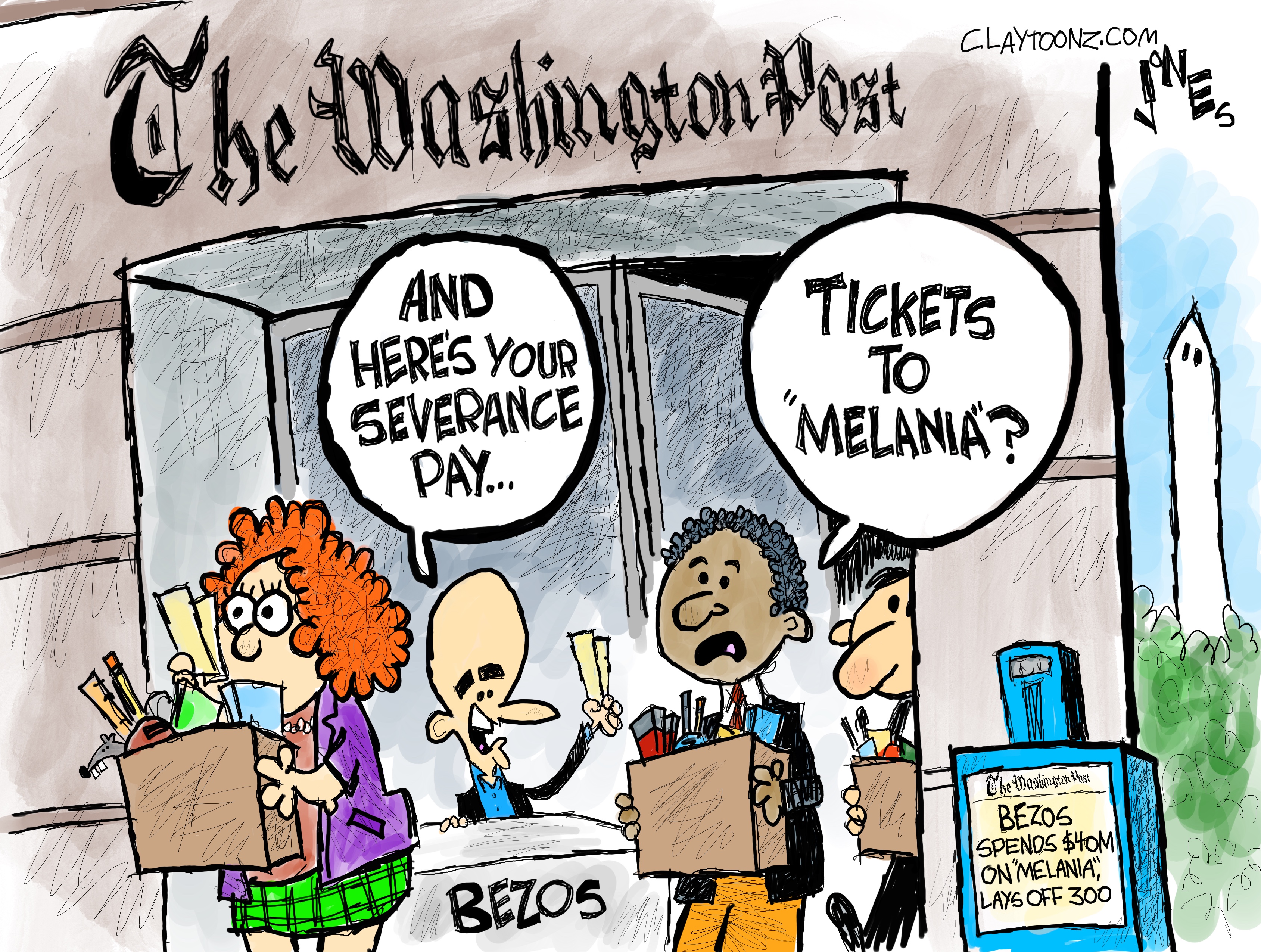The big problem with Obama's veto threats
Americans are sick of gridlock — and many no longer care whose fault it is


A free daily email with the biggest news stories of the day – and the best features from TheWeek.com
You are now subscribed
Your newsletter sign-up was successful
Barack Obama ran as a hope-and-change candidate who was going to forget about red states and blue states and have us all singing "kumbaya" together on some make-believe hilltop in the Land of Post-Partisanship. Those dreams are long since dashed — as the president's critics on both sides acknowledge. But we got yet another reminder about the president's inability to bridge partisan divides this week, when White House press secretary Josh Ernest declared, "If this bill passes this Congress, the president wouldn't sign it."
He was referring to the Keystone XL pipeline.
This project has been mired in controversy and delay for years. But it actually has supporters on both sides of the aisle, including labor unions on the left and free-market conservatives on the right. It's largely just liberal environmentalists who are pressuring Democrats to hold things up.
The Week
Escape your echo chamber. Get the facts behind the news, plus analysis from multiple perspectives.

Sign up for The Week's Free Newsletters
From our morning news briefing to a weekly Good News Newsletter, get the best of The Week delivered directly to your inbox.
From our morning news briefing to a weekly Good News Newsletter, get the best of The Week delivered directly to your inbox.
But Obama's own State Department produced an environmental impact statement long ago green-lighting the project. "The central finding in the draft environmental impact statement," The New Yorker's Ryan Lizza told NPR's Terry Gross last year, "was, if you don't build Keystone, the Canadians will sell this stuff anyway, they'll build pipelines to their east coast, to their west coast, and they'll send it to the Gulf of Mexico via rail — and by the way, sending oil by rail releases a whole lot more greenhouse gas emissions than putting it in a pipeline."
And as The New York Times noted a year ago, "The department’s long-awaited environmental impact statement appears to indicate that the project could pass the criteria Mr. Obama set forth in a speech last summer [2013] when he said he would approve the 1,700-mile pipeline if it would not 'significantly exacerbate' the problem of greenhouse gas emissions."
But there are powerful and wealthy environmental interests lined up against Keystone. As Jim Antle notes, "Billionaire environmentalist Tom Steyer spent heavily trying to rally voters against the pipeline. He supported Democrats, especially anti-Keystone ones, in key Senate races. Despite assembling $85 million in funding, most of Steyer's candidates — four out of six, to be exact — lost."
Obama has the ability to rhetorically present both sides of every issue. But he also has a habit of ultimately coming down on the left side. He's a liberal at heart. But there's more to it than that. Obama fans are loathe to admit it, but the president can be a divider, and an obstructionist.
A free daily email with the biggest news stories of the day – and the best features from TheWeek.com
If Obama were really concerned about bridging the gap, he wouldn't reflexively promise to veto the first piece of legislation presented to him by this new Congress. Doing so doesn't exactly demonstrate that he heard the message voters sent him in November when, yes, his policies were on the ballot, and yes, they were rejected. But perhaps more importantly, passing Keystone would be a gesture of goodwill to a new Congress. It might actually restore some small modicum of hope in the American people that their government can get something done — that we aren't predestined to suffer gridlock and obstructionism. And heck, half his party already wants Keystone, anyway.
The irony is that, had Obama governed the way he campaigned, he might have changed the paradigm, reordered the political scene, and essentially broken the Republican Party. I'm hardly alone in thinking this. During a recent episode of Conversations with Bill Kristol," former Speaker Newt Gingrich echoed my sentiment:
I listened to Obama's first inaugural — which really built on his Grant Park speech on election night, and on his speech in Manassas in Virginia on the Saturday before the election. And Callista and I were at the Capitol for the inaugural, and I turned to her on the way out, and I said: "If he'll govern the way he just spoke, he'll be Eisenhower. He'll split the Republican Party, he'll dominate the country. And within six weeks, Pelosi and Reed had convinced him to go to the left, write totally partisan bills, close out the Republicans. And he just threw away the chance to be, sort of the great re-unifier. [Newt Gingrich]
It's not as simple as that, of course. The GOP wasn't exactly itching to compromise with Obama. But as much as liberals don't want to admit it, and want to blame all of Obama's failures on the GOP, he's the president. It's his job to lead. And, as this veto threat demonstrates, he's a real part of the problem in Washington.
Matt K. Lewis is a contributing editor at TheWeek.com and a senior contributor for The Daily Caller. He has written for outlets including GQ Politics, The Guardian, and Politico, and has been cited or quoted by outlets including New York Magazine, the Washington Post, and The New York Times. Matt co-hosts The DMZ on Bloggingheads.TV, and also hosts his own podcast. In 2011, Business Insider listed him as one of the 50 "Pundits You Need To Pay Attention To Between Now And The Election." And in 2012, the American Conservative Union honored Matt as their CPAC "Blogger of the Year." He currently lives in Alexandria, Va.
-
 Nan Goldin: The Ballad of Sexual Dependency – an ‘engrossing’ exhibition
Nan Goldin: The Ballad of Sexual Dependency – an ‘engrossing’ exhibitionThe Week Recommends All 126 images from the American photographer’s ‘influential’ photobook have come to the UK for the first time
-
 American Psycho: a ‘hypnotic’ adaptation of the Bret Easton Ellis classic
American Psycho: a ‘hypnotic’ adaptation of the Bret Easton Ellis classicThe Week Recommends Rupert Goold’s musical has ‘demonic razzle dazzle’ in spades
-
 Political cartoons for February 6
Political cartoons for February 6Cartoons Friday’s political cartoons include Washington Post layoffs, no surprises, and more
-
 The billionaires’ wealth tax: a catastrophe for California?
The billionaires’ wealth tax: a catastrophe for California?Talking Point Peter Thiel and Larry Page preparing to change state residency
-
 Bari Weiss’ ‘60 Minutes’ scandal is about more than one report
Bari Weiss’ ‘60 Minutes’ scandal is about more than one reportIN THE SPOTLIGHT By blocking an approved segment on a controversial prison holding US deportees in El Salvador, the editor-in-chief of CBS News has become the main story
-
 Has Zohran Mamdani shown the Democrats how to win again?
Has Zohran Mamdani shown the Democrats how to win again?Today’s Big Question New York City mayoral election touted as victory for left-wing populists but moderate centrist wins elsewhere present more complex path for Democratic Party
-
 Millions turn out for anti-Trump ‘No Kings’ rallies
Millions turn out for anti-Trump ‘No Kings’ ralliesSpeed Read An estimated 7 million people participated, 2 million more than at the first ‘No Kings’ protest in June
-
 Ghislaine Maxwell: angling for a Trump pardon
Ghislaine Maxwell: angling for a Trump pardonTalking Point Convicted sex trafficker's testimony could shed new light on president's links to Jeffrey Epstein
-
 The last words and final moments of 40 presidents
The last words and final moments of 40 presidentsThe Explainer Some are eloquent quotes worthy of the holders of the highest office in the nation, and others... aren't
-
 The JFK files: the truth at last?
The JFK files: the truth at last?In The Spotlight More than 64,000 previously classified documents relating the 1963 assassination of John F. Kennedy have been released by the Trump administration
-
 'Seriously, not literally': how should the world take Donald Trump?
'Seriously, not literally': how should the world take Donald Trump?Today's big question White House rhetoric and reality look likely to become increasingly blurred
